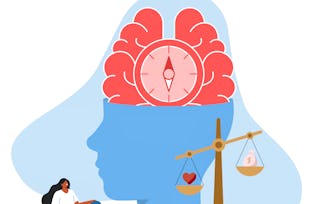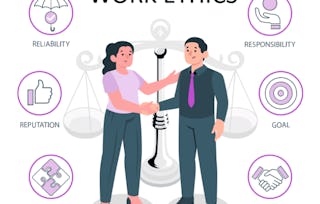How can we explain kindness and cruelty? Where does our sense of right and wrong come from? Why do people so often disagree about moral issues? This course explores the psychological foundations of our moral lives.

Moralities of Everyday Life

3,410 reviews
Skills you'll gain
Details to know

Add to your LinkedIn profile
6 assignments
See how employees at top companies are mastering in-demand skills

There are 7 modules in this course
What's included
2 videos4 readings
What is morality, anyway? What are the big debates in the field of moral psychology?
What's included
8 videos1 reading1 assignment
Where does concern for others come from? How is it related to empathy—and is more empathy necessarily a good thing? And what can we learn from the study of those who seemingly lack normal moral feelings, such as violent psychopaths?
What's included
6 videos1 reading1 assignment
Here, we ask about which aspects of morality are universal. We discuss evolution, cross-cultural research, and the fascinating new science of the moral life of babies.
What's included
10 videos1 reading1 assignment
How does culture influence our moral thought and moral action? What role does religion play? Why are some of us conservative and others liberal, and how do political differences influence our sense of right and wrong?
What's included
9 videos1 reading1 assignment
Our moral feelings are usually most powerful towards our kin (such as our parents and our children) and our friends and allies. We will discuss these special bonds, and then turn to the morality of racial and ethnic bias. Then we use the tools of behavioral economics to explore the controversial question of whether we are ever truly altruistic to strangers.
What's included
10 videos1 reading1 assignment
We’ll discuss some clever studies that show how our moral behavior is powerfully influenced—often at the unconscious level—by the situations that we find ourselves in. Such findings raise some hard problems about determinism, free will, and moral responsibility. Most of all, if our actions are determined by our brains, our genes, and our situations, in what sense can we be said to be moral agents? The course will end by trying to address this question.
What's included
6 videos2 readings1 assignment
Instructor

Offered by
Explore more from Psychology
 Status: Preview
Status: PreviewUniversity of Pennsylvania
 Status: Preview
Status: PreviewWesleyan University
 Status: Free Trial
Status: Free TrialLearnKartS
 Status: Free
Status: FreePrinceton University
Why people choose Coursera for their career

Felipe M.

Jennifer J.

Larry W.

Chaitanya A.
Learner reviews
- 5 stars
86.45%
- 4 stars
11.90%
- 3 stars
1.11%
- 2 stars
0.26%
- 1 star
0.26%
Showing 3 of 3410
Reviewed on Jun 19, 2022
Great class, i took it in order to better understand myself (why I make the decisions i do), how to become a better person, and to understand why others make the choices that they do.
Reviewed on May 5, 2020
Enjoyed the course immensely. Professor Bloom really is excellent! He provides entertaining lectures and is also quite funny. High quality overall, learned a lot. Highly recommended!
Reviewed on Jun 7, 2017
A really wonderful course taught by a knowledgable professor. The pace of the course is just alright with sometimes questions inside the video to keep you engaged. An awesome experience!

Open new doors with Coursera Plus
Unlimited access to 10,000+ world-class courses, hands-on projects, and job-ready certificate programs - all included in your subscription
Advance your career with an online degree
Earn a degree from world-class universities - 100% online
Join over 3,400 global companies that choose Coursera for Business
Upskill your employees to excel in the digital economy
Frequently asked questions
To access the course materials, assignments and to earn a Certificate, you will need to purchase the Certificate experience when you enroll in a course. You can try a Free Trial instead, or apply for Financial Aid. The course may offer 'Full Course, No Certificate' instead. This option lets you see all course materials, submit required assessments, and get a final grade. This also means that you will not be able to purchase a Certificate experience.
When you purchase a Certificate you get access to all course materials, including graded assignments. Upon completing the course, your electronic Certificate will be added to your Accomplishments page - from there, you can print your Certificate or add it to your LinkedIn profile.
Yes. In select learning programs, you can apply for financial aid or a scholarship if you can’t afford the enrollment fee. If fin aid or scholarship is available for your learning program selection, you’ll find a link to apply on the description page.
More questions
Financial aid available,

